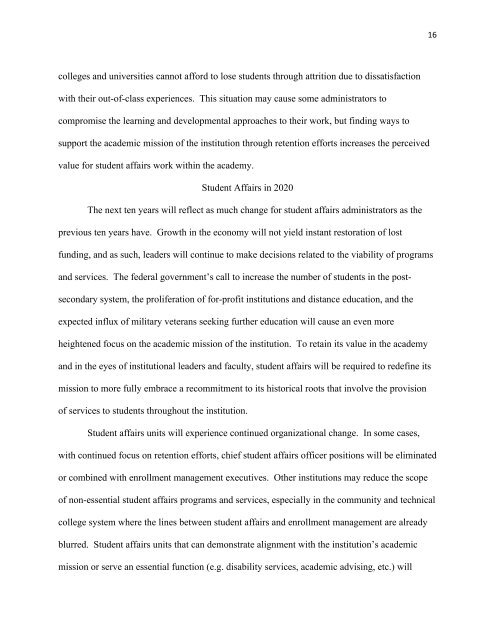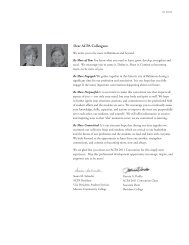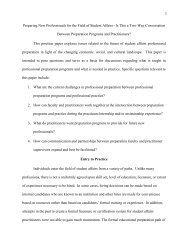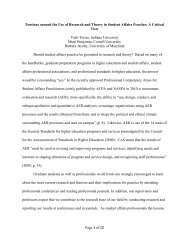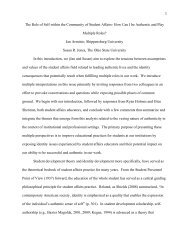Is Student Affairs Relevant for the 21st Century? Tony W. Cawthon ...
Is Student Affairs Relevant for the 21st Century? Tony W. Cawthon ...
Is Student Affairs Relevant for the 21st Century? Tony W. Cawthon ...
You also want an ePaper? Increase the reach of your titles
YUMPU automatically turns print PDFs into web optimized ePapers that Google loves.
colleges and universities cannot af<strong>for</strong>d to lose students through attrition due to dissatisfaction<br />
with <strong>the</strong>ir out-of-class experiences. This situation may cause some administrators to<br />
compromise <strong>the</strong> learning and developmental approaches to <strong>the</strong>ir work, but finding ways to<br />
support <strong>the</strong> academic mission of <strong>the</strong> institution through retention ef<strong>for</strong>ts increases <strong>the</strong> perceived<br />
value <strong>for</strong> student affairs work within <strong>the</strong> academy.<br />
<strong>Student</strong> <strong>Affairs</strong> in 2020<br />
The next ten years will reflect as much change <strong>for</strong> student affairs administrators as <strong>the</strong><br />
previous ten years have. Growth in <strong>the</strong> economy will not yield instant restoration of lost<br />
funding, and as such, leaders will continue to make decisions related to <strong>the</strong> viability of programs<br />
and services. The federal government’s call to increase <strong>the</strong> number of students in <strong>the</strong> post-<br />
secondary system, <strong>the</strong> proliferation of <strong>for</strong>-profit institutions and distance education, and <strong>the</strong><br />
expected influx of military veterans seeking fur<strong>the</strong>r education will cause an even more<br />
heightened focus on <strong>the</strong> academic mission of <strong>the</strong> institution. To retain its value in <strong>the</strong> academy<br />
and in <strong>the</strong> eyes of institutional leaders and faculty, student affairs will be required to redefine its<br />
mission to more fully embrace a recommitment to its historical roots that involve <strong>the</strong> provision<br />
of services to students throughout <strong>the</strong> institution.<br />
<strong>Student</strong> affairs units will experience continued organizational change. In some cases,<br />
with continued focus on retention ef<strong>for</strong>ts, chief student affairs officer positions will be eliminated<br />
or combined with enrollment management executives. O<strong>the</strong>r institutions may reduce <strong>the</strong> scope<br />
of non-essential student affairs programs and services, especially in <strong>the</strong> community and technical<br />
college system where <strong>the</strong> lines between student affairs and enrollment management are already<br />
blurred. <strong>Student</strong> affairs units that can demonstrate alignment with <strong>the</strong> institution’s academic<br />
mission or serve an essential function (e.g. disability services, academic advising, etc.) will<br />
16


